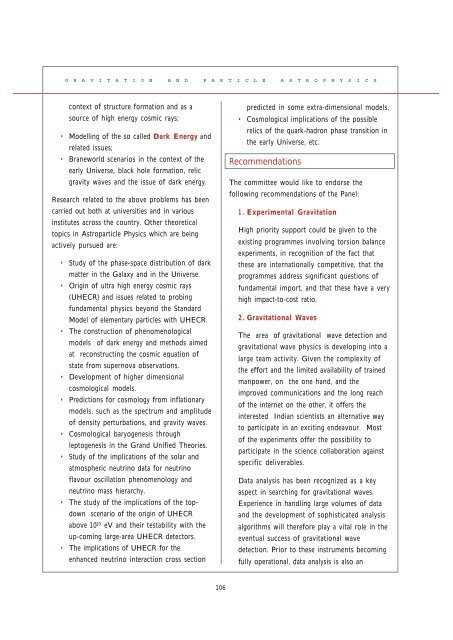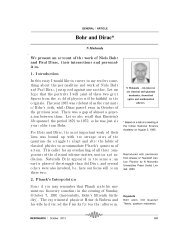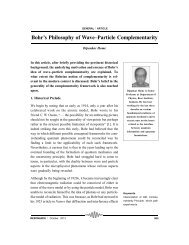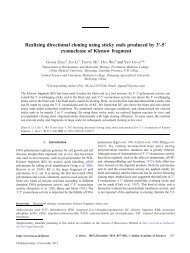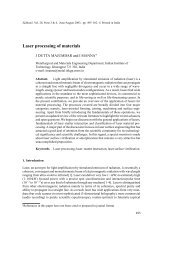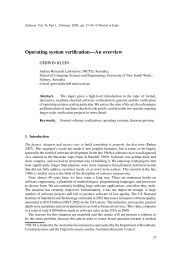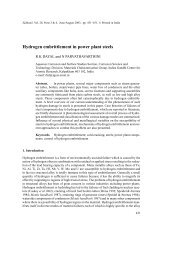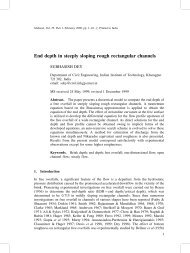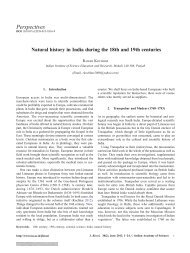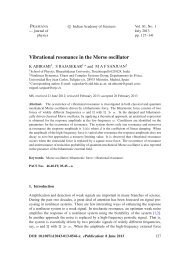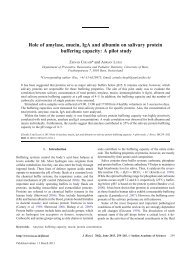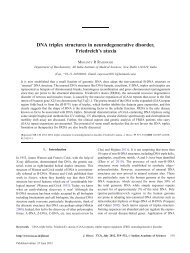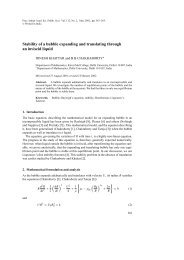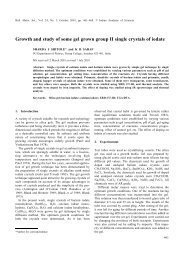2004 ASTRONOMY & ASTROPHYSICS - Indian Academy of Sciences
2004 ASTRONOMY & ASTROPHYSICS - Indian Academy of Sciences
2004 ASTRONOMY & ASTROPHYSICS - Indian Academy of Sciences
Create successful ePaper yourself
Turn your PDF publications into a flip-book with our unique Google optimized e-Paper software.
GRAVITATION AND PARTICLE <strong>ASTROPHYSICS</strong><br />
context <strong>of</strong> structure formation and as a<br />
source <strong>of</strong> high energy cosmic rays;<br />
• Modelling <strong>of</strong> the so called Dark Energy and<br />
related issues;<br />
• Braneworld scenarios in the context <strong>of</strong> the<br />
early Universe, black hole formation, relic<br />
gravity waves and the issue <strong>of</strong> dark energy.<br />
Research related to the above problems has been<br />
carried out both at universities and in various<br />
institutes across the country. Other theoretical<br />
topics in Astroparticle Physics which are being<br />
actively pursued are:<br />
• Study <strong>of</strong> the phase-space distribution <strong>of</strong> dark<br />
matter in the Galaxy and in the Universe.<br />
• Origin <strong>of</strong> ultra high energy cosmic rays<br />
(UHECR) and issues related to probing<br />
fundamental physics beyond the Standard<br />
Model <strong>of</strong> elementary particles with UHECR.<br />
• The construction <strong>of</strong> phenomenological<br />
models <strong>of</strong> dark energy and methods aimed<br />
at reconstructing the cosmic equation <strong>of</strong><br />
state from supernova observations.<br />
• Development <strong>of</strong> higher dimensional<br />
cosmological models.<br />
• Predictions for cosmology from inflationary<br />
models, such as the spectrum and amplitude<br />
<strong>of</strong> density perturbations, and gravity waves.<br />
• Cosmological baryogenesis through<br />
leptogenesis in the Grand Unified Theories.<br />
• Study <strong>of</strong> the implications <strong>of</strong> the solar and<br />
atmospheric neutrino data for neutrino<br />
flavour oscillation phenomenology and<br />
neutrino mass hierarchy.<br />
• The study <strong>of</strong> the implications <strong>of</strong> the topdown<br />
scenario <strong>of</strong> the origin <strong>of</strong> UHECR<br />
above 10 20 eV and their testability with the<br />
up-coming large-area UHECR detectors.<br />
• The implications <strong>of</strong> UHECR for the<br />
enhanced neutrino interaction cross section<br />
predicted in some extra-dimensional models,<br />
• Cosmological implications <strong>of</strong> the possible<br />
relics <strong>of</strong> the quark-hadron phase transition in<br />
the early Universe, etc.<br />
Recommendations<br />
The committee would like to endorse the<br />
following recommendations <strong>of</strong> the Panel:<br />
1.Experimental Gravitation<br />
High priority support could be given to the<br />
existing programmes involving torsion balance<br />
experiments, in recognition <strong>of</strong> the fact that<br />
these are internationally competitive, that the<br />
programmes address significant questions <strong>of</strong><br />
fundamental import, and that these have a very<br />
high impact-to-cost ratio.<br />
2. Gravitational Waves<br />
The area <strong>of</strong> gravitational wave detection and<br />
gravitational wave physics is developing into a<br />
large team activity. Given the complexity <strong>of</strong><br />
the effort and the limited availability <strong>of</strong> trained<br />
manpower, on the one hand, and the<br />
improved communications and the long reach<br />
<strong>of</strong> the internet on the other, it <strong>of</strong>fers the<br />
interested <strong>Indian</strong> scientists an alternative way<br />
to participate in an exciting endeavour. Most<br />
<strong>of</strong> the experiments <strong>of</strong>fer the possibility to<br />
participate in the science collaboration against<br />
specific deliverables.<br />
Data analysis has been recognized as a key<br />
aspect in searching for gravitational waves.<br />
Experience in handling large volumes <strong>of</strong> data<br />
and the development <strong>of</strong> sophisticated analysis<br />
algorithms will therefore play a vital role in the<br />
eventual success <strong>of</strong> gravitational wave<br />
detection. Prior to these instruments becoming<br />
fully operational, data analysis is also an<br />
106


